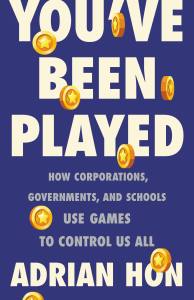Adrian Hon’s Fast Facts About How Corporations Use Games to Control Us
Points, badges, and leaderboards are creeping into every aspect of modern life. In You’ve Been Played, game designer Adrian Hon delivers a blistering takedown of how corporations, schools, and governments use games and gamification as tools for profit and coercion. You’ve Been Played is a scathing indictment of a tech-driven world that wants to convince us that misery is fun, and a call to arms for anyone who hopes to preserve their dignity and autonomy. Read ahead for Adrian’s six fast facts about how corporations use games to control us.
1. Gamification – using ideas from game for non-entertainment purposes – is built into the most popular smartphones and smartwatches today.
Whether it’s Apple Books rewarding you for hitting your daily reading goals or extending your “reading streak”, or your Fitbit encouraging you to beat your friends by walking and running more, gamification is becoming inescapable.
2. Whether you’re a warehouse worker, a programmer, a call center operator, or even work in finance, your workplace is being gamified.
Amazon has introduce video games into dozens of its warehouses around the world to motivate workers; Uber and Lyft use quests and mission to get drivers to do more; programmers are made to compete in online contests on sites like Leetcode and Crossover; and call center operators have their performance scored on every second of every call.
3. 95% of US school use gamification in the form of Classdojo’s app that lets teachers reward and punish students with points.
Classdojo is used in 180 countries and has attracted intense praise and criticism, with the English children’s commissioner worried it “contributes to a practice where children are increasingly being monitored and tracked around the clock, which may impact upon their development and experience of a childhood.” Universities and colleges are also adopting gamification through apps like Spotter and Degree Analytics, which track students’ phones via Bluetooth and Wi-Fi to award class “attendance points” in real time.
4. Million of US truck drivers now have their driving monitored by Electronic Logging Devices, which are increasingly gamified.
Thanks to a government mandate to improve road safety, practically all US truck drivers must use special devices to monitor their “hours of service” spent driving – and “fleet telematics” is allowing gamification to seep in, with one executive noting “Gamification makes the leap from Big Brother to this is fun. This is what has always been missing with telematics.”
5. Pinduodo, a hyper-gamified Chinese shopping app, has over 700 million active users.
Chinese shopping apps feature some of the most sophisticated forms of gamification to encourage users to keep spending and and keep coming back, with incentives to refer friends and snap up “discounts”. SHEIN, the Chinese fashion app that’s exploding in the west, also uses gamification…
6. Even video games are being gamified now, through “lootboxes” that gambling. Lootboxes are digital treasuse chests containing desirable items of varying rarity – a bit like trading cards!
You’d think video games are already fun, but companies are using achievements, quests, paid upgrades, and lootboxes to encourage players to spend more time and more money than they’d ever intended to. Some countries have already banned lootboxes as a result.
How games are being harnessed as instruments of exploitation—and what we can do about it
Warehouse workers pack boxes while a virtual dragon races across their screen. If they beat their colleagues, they get an award. If not, they can be fired. Uber presents exhausted drivers with challenges to keep them driving. China scores its citizens so they behave well, and games with in-app purchases use achievements to empty your wallet.
Points, badges, and leaderboards are creeping into every aspect of modern life. In You’ve Been Played, game designer Adrian Hon delivers a blistering takedown of how corporations, schools, and governments use games and gamification as tools for profit and coercion. These are games that we often have no choice but to play, where losing has heavy penalties. You’ve Been Played is a scathing indictment of a tech-driven world that wants to convince us that misery is fun, and a call to arms for anyone who hopes to preserve their dignity and autonomy.
